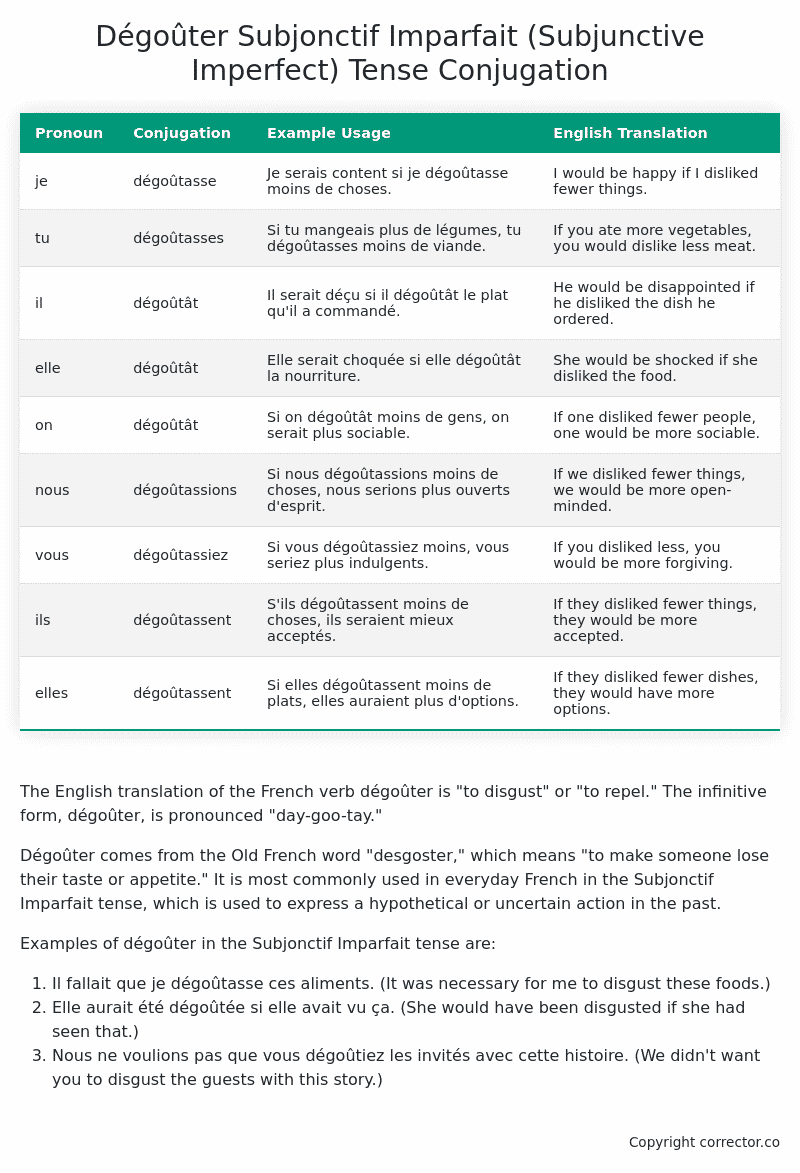Subjonctif Imparfait (Subjunctive Imperfect) Tense Conjugation of the French Verb dégoûter
Introduction to the verb dégoûter
The English translation of the French verb dégoûter is “to disgust” or “to repel.” The infinitive form, dégoûter, is pronounced “day-goo-tay.”
Dégoûter comes from the Old French word “desgoster,” which means “to make someone lose their taste or appetite.” It is most commonly used in everyday French in the Subjonctif Imparfait tense, which is used to express a hypothetical or uncertain action in the past.
Examples of dégoûter in the Subjonctif Imparfait tense are:
- Il fallait que je dégoûtasse ces aliments. (It was necessary for me to disgust these foods.)
- Elle aurait été dégoûtée si elle avait vu ça. (She would have been disgusted if she had seen that.)
- Nous ne voulions pas que vous dégoûtiez les invités avec cette histoire. (We didn’t want you to disgust the guests with this story.)
Table of the Subjonctif Imparfait (Subjunctive Imperfect) Tense Conjugation of dégoûter
| Pronoun | Conjugation | Example Usage | English Translation |
|---|---|---|---|
| je | dégoûtasse | Je serais content si je dégoûtasse moins de choses. | I would be happy if I disliked fewer things. |
| tu | dégoûtasses | Si tu mangeais plus de légumes, tu dégoûtasses moins de viande. | If you ate more vegetables, you would dislike less meat. |
| il | dégoûtât | Il serait déçu si il dégoûtât le plat qu’il a commandé. | He would be disappointed if he disliked the dish he ordered. |
| elle | dégoûtât | Elle serait choquée si elle dégoûtât la nourriture. | She would be shocked if she disliked the food. |
| on | dégoûtât | Si on dégoûtât moins de gens, on serait plus sociable. | If one disliked fewer people, one would be more sociable. |
| nous | dégoûtassions | Si nous dégoûtassions moins de choses, nous serions plus ouverts d’esprit. | If we disliked fewer things, we would be more open-minded. |
| vous | dégoûtassiez | Si vous dégoûtassiez moins, vous seriez plus indulgents. | If you disliked less, you would be more forgiving. |
| ils | dégoûtassent | S’ils dégoûtassent moins de choses, ils seraient mieux acceptés. | If they disliked fewer things, they would be more accepted. |
| elles | dégoûtassent | Si elles dégoûtassent moins de plats, elles auraient plus d’options. | If they disliked fewer dishes, they would have more options. |
Other Conjugations for Dégoûter.
Le Present (Present Tense) Conjugation of the French Verb dégoûter
Imparfait (Imperfect) Tense Conjugation of the French Verb dégoûter
Passé Simple (Simple Past) Tense Conjugation of the French Verb dégoûter
Passé Composé (Present Perfect) Tense Conjugation of the French Verb dégoûter
Futur Simple (Simple Future) Tense Conjugation of the French Verb dégoûter
Futur Proche (Near Future) Tense Conjugation of the French Verb dégoûter
Plus-que-parfait (Pluperfect) Tense Conjugation of the French Verb dégoûter
Passé Antérieur (Past Anterior) Tense Conjugation of the French Verb dégoûter
Futur Antérieur (Future Anterior) Tense Conjugation of the French Verb dégoûter
Subjonctif Présent (Subjunctive Present) Tense Conjugation of the French Verb dégoûter
Subjonctif Passé (Subjunctive Past) Tense Conjugation of the French Verb dégoûter
Subjonctif Imparfait (Subjunctive Imperfect) Tense Conjugation of the French Verb dégoûter (this article)
Subjonctif Plus-que-parfait (Subjunctive Pluperfect) Tense Conjugation of the French Verb dégoûter
Conditionnel Présent (Conditional Present) Tense Conjugation of the French Verb dégoûter
Conditionnel Passé (Conditional Past) Tense Conjugation of the French Verb dégoûter
L’impératif Présent (Imperative Present) Tense Conjugation of the French Verb dégoûter
L’infinitif Présent (Infinitive Present) Tense Conjugation of the French Verb dégoûter
Struggling with French verbs or the language in general? Why not use our free French Grammar Checker – no registration required!
Get a FREE Download Study Sheet of this Conjugation 🔥
Simply right click the image below, click “save image” and get your free reference for the dégoûter Subjonctif Imparfait tense conjugation!

Dégoûter – About the French Subjonctif Imparfait (Subjunctive Imperfect) Tense
Formation
Common Everyday Usage Patterns
Interactions with Other Tenses
Subjonctif Présent
Indicatif Passé Composé
Conditional
Conditional Perfect
Summary
I hope you enjoyed this article on the verb dégoûter. Still in a learning mood? Check out another TOTALLY random French verb conjugation!


